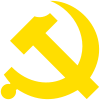Politburo Standing Committee of the Communist Party of China
| Standing Committee of the Central Political Bureau of the Communist Party of China 中国共产党中央政治局常务委员会 | |
|---|---|
 | |
| Leadership | |
Status | |
Members | |
Elected by | |
Responsible to | |
| Seats |
5-9 historically; 7 currently |
| Standing Committee of the Politburo of the Communist Party of China | |||||||
| Simplified Chinese | 中国共产党中央政治局常务委员会 | ||||||
|---|---|---|---|---|---|---|---|
| Traditional Chinese | 中國共產黨中央政治局常務委員會 | ||||||
| Literal meaning | China Communist Party Central Politburo Standing Committee | ||||||
| |||||||
| Abbreviation(s) | |||||||
| Simplified Chinese | ((中共)中央)政治局常委会 | ||||||
| Traditional Chinese | ((中共)中央)政治局常委會 | ||||||
| Literal meaning | ((CPC) Central) Politburo Standing-Committee | ||||||
| |||||||
| This article is part of a series on the |
| Politics of the People's Republic of China |
|---|
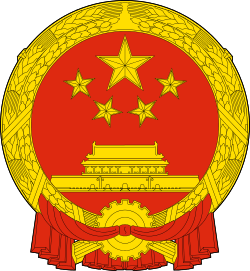 |
| Commonly known as China |
|
|
|
China portal |
The Standing Committee of the Central Political Bureau of the Communist Party of China, usually known as the Politburo Standing Committee (PSC), is a committee consisting of the top leadership of the Communist Party of China. Historically it has been composed of five to nine members, and currently has seven members. Its officially mandated purpose is to conduct policy discussions and make decisions on major issues when the Politburo, a larger decision-making body, is not in session. According to the party's Constitution, the General Secretary of the Central Committee must also be a member of the Politburo Standing Committee.[1]
While the PSC in theory reports into the Politburo, which in turn reports into the larger Central Committee, in practice the PSC acts as the most powerful decision-making body in China, and its decisions de facto have the force of law. Its membership is closely watched by both the national media as well as political watchers abroad. Historically, the role of the PSC has varied and evolved. During the Cultural Revolution, for example, the PSC had little power.
The membership of the PSC is strictly ranked in protocol sequence. Historically, the General Secretary (or Party Chairman) has been ranked first; the rankings of other leaders have varied over time. Since the 1990s, the General Secretary, Premier, Chairman of the National People's Congress, the Chairman of the Chinese People's Political Consultative Conference, the Secretary of the Central Commission for Discipline Inspection, the party's top anti-graft body, and the first-ranked Secretary of the Secretariat have consistently also been members of the Politburo Standing Committee.[2] The portfolios of additional members varied.
Terminology
The Politburo Standing Committee is technically responsible to the Politburo of the Communist Party of China. In Chinese political usage, a "Standing Committee" (常务委员会, Chángwù Wěiyuánhuì) simply refers to a body that carries out the day-to-day affairs of its parent organ, in this case, the Politburo. The Politburo, in turn, is a policy making body that is formally responsible to the larger Central Committee, which meets at plenary sessions usually once every year.
"Politburo Standing Committee" is the most commonly used name to refer to the body in English-language media. It is sometimes abbreviated PSC or PBSC (if "Politburo" is written as "Political Bureau"). It can also be referred to informally as simply the "Standing Committee". In its official English-language press releases, Chinese state media refers to the body by its lengthier, formal name, "The Standing Committee of the Political Bureau of the CPC Central Committee". In turn, its members are officially referred to as "Members of Standing Committee of the Political Bureau of the CPC Central Committee". These official forms are rarely used by English-language newspapers outside of mainland China.
In official Chinese-language announcements, the most commonly used name for members of the body is Zhōnggòng Zhōngyāng Zhèngzhìjú Chángwěi (中共中央政治局常委); this is an abbreviation of the much lengthier official title of Zhōngguó Gòngchǎndǎng Zhōngyāng Zhèngzhìjú Chángwù Wěiyuánhuì Wěiyuán (中国共产党中央政治局常务委员会委员). As even the officially abbreviated terminology may still be too lengthy and unwieldy, some media outlets refer to PSC members as Zhèngzhìjú Chángwěi (政治局常委) or simply Chángwěi (常委). Do note that without any context, Changwei may still be an ambiguous term, as provincial and local party committees all have a Standing Committee, the members of this committee can also be known as Changwei.
History
Early History
The first Standing Committee was formed in July 1928. Between January 1934 and the Eighth Party Congress in 1956, the Standing Committee was replaced by the Central Secretariat. In the early history of the Communist Party as the highest central body that was intended to carry out day-to-day work of the Party's Central Committee. It was composed of the top leadership figures of the larger Political Bureau (i.e., the "Politburo"). Unlike most other Communist parties in the world modeled after the party of Lenin, the CPC formed a Standing Committee because the Politburo (normally the highest organ in a Communist Party) was considered too large and unwieldy to make decisions effectively.
Cultural Revolution
In the early days of the Cultural Revolution, the Politburo Standing Committee ceased normal operations, as many of its key members, such as Liu Shaoqi and Deng Xiaoping, fell out of favour with Mao. Real power was concentrated in the Cultural Revolution Group, which was nominally reporting to the Politburo Standing Committee but in fact was a separate "centre of authority" that acted mostly on its own accord. At the 9th National Congress of the Communist Party of China, radical supporters of Mao, Chen Boda, and Kang Sheng, gained seats on the Politburo Standing Committee, and it resumed a somewhat normal functioning. The last years of the Cultural Revolution were dominated by internal chaos. Between 1975 and 1976, PSC members Kang Sheng, Zhou Enlai, Zhu De, and Mao all died. Deng Xiaoping was purged. During this time the body lost any semblance of a functioning policy-making or executive organ, and it met only on an ad hoc basis. By Mao's death in September 1976, the only members who still attended meetings were Hua Guofeng, Zhang Chunqiao, Wang Hongwen, and Ye Jianying, with Zhang and Wang being members of the Gang of Four. On 6 October, Hua Guofeng called a PSC meeting ostensibly to discuss Mao's legacy and memorial arrangements, inviting the active PSC members to attend. Wang and Zhang were both arrested at the meeting and accused of "counter-revolutionary crimes". Thereafter, only Ye and Hua continued their official duties. A functioning PSC was not restored until 1977.
After economic reforms
After taking power in 1978, one of the goals of Deng Xiaoping was to strengthen the power of the party and institutionalize bodies such as the Politburo and its Standing Committee. For much of the 1980s, the PSC was restored as the party's supreme decision making body. The Committee was again organized on the basis of democratic centralism, that is, decisions were to be made based on consensus, and, failing that, decisions are taken by majority vote; once a decision is taken the entire body speaks with one voice. However, the PSC competed with retired party elders (organized as the Central Advisory Commission, though they made most of their decisions informally) for influence. Deng Xiaoping himself bridged the two bodies, and his informal clout translated to great political power personally. In 1987, Deng and other party elders ousted then General Secretary Hu Yaobang from the PSC, replacing him with Zhao Ziyang. In 1989, Deng and various party elders ordered the military to intervene in the Tiananmen Protests of 1989 without gaining the consensus of the PSC. Zhao was opposed to declaring martial law and broke with other members of the PSC, notably Premier Li Peng. In the aftermath, Zhao and Hu Qili were removed from the PSC at the Fourth Plenum in 1989, largely by fiat of Deng and the elders rather than institutional procedure, to be replaced by Jiang Zemin and Li Ruihuan.
The operation of the Standing Committee has remained largely stable since Tiananmen in 1989. The 1989 Plenum was the last occasion where a major reshuffle of the PSC occurred. At the 14th Party Congress in 1992, seven people – Jiang, Li Peng, Qiao Shi, Li Ruihuan, Zhu Rongji, Liu Huaqing, and Hu Jintao – were named to the Standing Committee, this arrangement remained unchanged until the regularly scheduled 15th Party Congress in 1997, where Qiao Shi and Liu Huaqing retired and were replaced by Wei Jianxing and Li Lanqing, showing the first signs that the PSC would become a term-based body operating on a fixed schedule. Hu Jintao also became Vice-President, a largely ceremonial post, in 1998, as he was being groomed to succeed Jiang. This was the first time a Standing Committee member had occupied the post of Vice-President.
At the 16th Party Congress held in 2002, the Standing Committee was expanded from seven to nine members. Some political observers speculated that the expansion was done in order to stack the new Standing Committee with loyalists of Jiang Zemin, though this characterization has been disputed. During Hu Jintao's term as General Secretary (2002 – 2012), the PSC could be understood as a "leadership collective" or a "joint presidency"; that is, essentially a body operating on consensus that executes powers normally granted to a single officeholder. The 16th Party Congress also saw Li Changchun gain a seat on the PSC without a formally defined portfolio, though he was widely considered to be the "propaganda chief".
At the 18th Party Congress held in 2012, membership of the PSC was yet again reduced to seven members.[3] The head of the Political and Legal Affairs Commission did not feature in the new Standing Committee, neither did the Vice-President. The positions of executive secretary of the Secretariat and that of "propaganda chief" were consolidated into one person, Liu Yunshan.
Contemporary selection considerations
According to informed academic observers such as Cheng Li, a scholar at Brookings Institution, and Susan Shirk of the Graduate School of International Relations and Pacific Studies, rise in the Chinese political system and selection to the Standing Committee depends more on family connections and loyalty to powerful patrons than on ability.[4] It was widely believed, for example, that the Standing Committee line-up of the 16th Party Congress included several members who were elevated based on their relationship with outgoing General Secretary Jiang Zemin, including, most notably, Zeng Qinghong, Huang Ju, and Jia Qinglin.[2] Selection of members following the 16th Party Congress is believed to be largely the result of high-level consultations in the upper echelons of the party leadership. Much has been written on the divide between Princelings and the Tuanpai (Youth League faction) between the 16th and 18th Congresses, though it is not precisely known to what extent factional identity played in the selection of PSC members.
Seniority also played an important role. It was established convention that a member of the PSC must have served for at least one term on the Politburo prior to entry to the PSC. However, this "rule" had been broken several times by those destined for party leader or the premiership, most notably with Zhu Rongji and Hu Jintao in 1992, and Li Keqiang and Xi Jinping in 2007. Jiang Zemin was also in the middle of serving out his first term on the Politburo before he was suddenly made General Secretary and thus a member of the PSC in 1989.
Since the late 1990s, almost all PSC members have experience as a party chief of a province or a direct-controlled municipality. Since 1997, the only individuals who have not held regional party chief positions and have also earned a seat on the PSC were Li Peng, Wen Jiabao, Li Lanqing, Luo Gan, and Liu Yunshan; of these, only Li Peng and Wen Jiabao have never served in a regional leadership role.
Age is also key. For instance, since 1989, almost all Standing Committee members have been at least 50 years old at the time of their appointment. Hu Jintao was 50 upon his appointment to the PSC at the 14th Party Congress in 1992. Xi Jinping was 54 and Li Keqiang was 52 at their appointment to the PSC at the 17th Party Congress in 2007.[5] At the same time, since the 16th Party Congress in 2002, PSC members who were 68 or older at the time of a Party Congress have retired without exception. This has been known as the rule of qi-shang, ba-xia (七上八下; lit. "seven up, eight down"), referring to the fact that if a PSC member is 68 or older at the time of a party congress, he must retire, but if he is 67 or younger, he may still enter the committee.
In 2002, apart from Hu Jintao, the entire outgoing PSC was replaced. Strict age-based retirement instituted in the CPC meant de facto term limits and relatively high turnover, with the vast majority of members serving for one or two terms. Since 1989, the only PSC member to have served more than three terms on the body was Hu Jintao, who served for four terms between 1992 and 2012. Policy views of ambitious aspirants are routinely concealed in order to gain the broadest level of consensus, with Hu Jintao being a prime example. Various theories have been proposed, mostly by academic outside of mainland China, to discern the 'factions' within a Standing Committee (often between "conservatives" and "reformers"), though in practice due to its opaque operations, faction membership has never been a hard-and-fast rule. Overly showy or high-profile 'campaigning' for the PSC, such as the actions of former Chongqing party chief Bo Xilai, were considered detrimental to PSC selection.[2][4]
Current members (in order)
| № | Portrait | Information | Party position(s) | State position(s) | |
|---|---|---|---|---|---|
| 1st [6] |
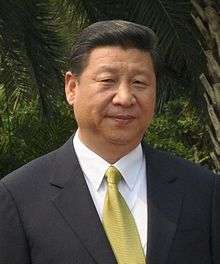 |
Name | Xi Jinping | General Secretary of the CPC Central Committee Chairman of the CPC Central Military Commission Leader of the Central Leading Group for Comprehensively Deepening Reforms Chairman of the National Security Commission |
President of the People's Republic of China Chairman of the PRC Central Military Commission |
| Birthplace | Xicheng District, Beijing | ||||
| NPC Constituency | Shanghai at-large | ||||
| Member since | 22 October 2007 | ||||
| 2nd [6] |
.jpg) |
Name | Li Keqiang | Party secretary of the State Council of the People's Republic of China Deputy Leader of the Central Leading Group for Comprehensively Deepening Reforms Vice Chairman of the National Security Commission |
Premier of the State Council of the People's Republic of China |
| Birthplace | Dingyuan County, Anhui | ||||
| NPC Constituency | Shandong at-large | ||||
| Member since | 22 October 2007 | ||||
| 3rd [6] |
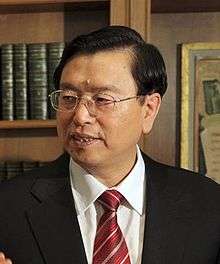 |
Name | Zhang Dejiang | Party secretary of the Standing Committee of the National People's Congress Vice Chairman of the National Security Commission |
Chairman of the Standing Committee of the National People's Congress |
| Birthplace | Tai'an County, Liaoning | ||||
| NPC Constituency | Zhejiang at-large | ||||
| Member since | 15 November 2012 | ||||
| 4th [6] |
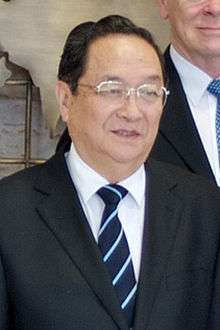 |
Name | Yu Zhengsheng | Party secretary of the National Committee of the Chinese People's Political Consultative Conference | Chairman of the National Committee of the Chinese People's Political Consultative Conference |
| Birthplace | Shaoxing, Zhejiang | ||||
| NPC Constituency | Hubei at-large | ||||
| Member since | 15 November 2012 | ||||
| 5th [6] |
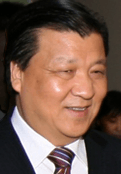 |
Name | Liu Yunshan | Top-ranked Secretary of the Central Secretariat of the CPC Chairman of the Central Guidance Commission for Building Spiritual Civilization President of the CPC Central Party School Deputy Leader of the Central Leading Group for Comprehensively Deepening Reforms |
|
| Birthplace | Tumed Right Banner, Inner Mongolia | ||||
| NPC Constituency | Inner Mongolia at-large | ||||
| Member since | 15 November 2012 | ||||
| 6th [6] |
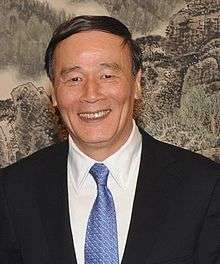 |
Name | Wang Qishan | Secretary of the Central Commission for Discipline Inspection | |
| Birthplace | Tianzhen County, Shanxi | ||||
| NPC Constituency | Beijing at-large | ||||
| Member since | 15 November 2012 | ||||
| 7th [6] |
 |
Name | Zhang Gaoli | Deputy Party secretary of the State Council of the People's Republic of China Deputy Leader of the Central Leading Group for Comprehensively Deepening Reforms |
First Vice Premier of the State Council of the People's Republic of China |
| Birthplace | Jinjiang, Fujian | ||||
| NPC Constituency | Tianjin at-large | ||||
| Member since | 15 November 2012 | ||||
In November 2012, the 18th PSC took office. Seven of the previous PSC members retired having exceeded the age of 67. Xi Jinping and Li Keqiang retained their seats.[7][3]
Depending on how the status is calculated (Wang Qishan is not a princeling himself, but his wife is[4]), 3 or 4 of the members are descendants of prominent and influential senior communist officials. The group is strongly committed to the constitutional role of the Communist Party as the leading party, reform being viewed as a matter of controlling corruption and establishing a better relationship between party organizations and governmental institutions and the people.[3] Most of the current members are considered to be allies of Jiang Zemin, the former General Secretary of the Communist Party of China who retired in 2003.[4]
Historical membership and rankings
The following is a list of the historical composition of the Standing Committee since the founding of the People's Republic of China in 1949, listed by official ranking protocol. Note that those ranked first hold the title of Chairman or General Secretary of the Communist Party. The remaining ranks vary.
- 8th PSC (elected September 1956): Mao Zedong, Liu Shaoqi, Zhou Enlai, Zhu De, Chen Yun, Lin Biao (X), Deng Xiaoping
- 8th PSC (Cultural Revolution re-shuffle, elected August 1966): Mao, Lin Biao (X), Zhou Enlai, Tao Zhu, Chen Boda (X), Deng Xiaoping, Kang Sheng (X), Liu Shaoqi (R), Zhu De, Li Fuchun, Chen Yun
- 9th PSC (elected April 1969): Mao, Lin Biao (X), Zhou Enlai, Chen Boda (X), Kang Sheng (X)
- 10th PSC (elected August 1973): Mao (D), Hua Guofeng (elevated April 1976), Zhou Enlai (D), Wang Hongwen (X), Kang Sheng (D, X), Ye Jianying, Li Desheng, Zhu De (D), Zhang Chunqiao (X), Dong Biwu (D), Deng Xiaoping (elected January 1975)
- 11th PSC (elected August 1977): Hua Guofeng, Ye Jianying, Deng Xiaoping, Li Xiannian, Wang Dongxing (resigned February 1980), Chen Yun, Hu Yaobang, Zhao Ziyang (elected February 1980)
- 12th PSC (elected September 1982): Hu Yaobang (removed January 1987), Ye Jianying (resigned September 1985), Deng Xiaoping, Zhao Ziyang, Li Xiannian, Chen Yun
- 13th PSC (elected November 1987): Zhao Ziyang, Li Peng, Qiao Shi, Hu Qili, Yao Yilin
- 13th PSC (Post-Tiananmen re-shuffle, elected June 1989): Jiang Zemin, Li Peng, Qiao Shi, Yao Yilin, Song Ping, Li Ruihuan
- 14th PSC (elected October 1992): Jiang Zemin, Li Peng, Qiao Shi, Li Ruihuan, Zhu Rongji, Liu Huaqing, Hu Jintao
- 15th PSC (elected September 1997): Jiang Zemin, Li Peng, Zhu Rongji, Li Ruihuan, Hu Jintao, Wei Jianxing, Li Lanqing
- 16th PSC (elected November 2002): Hu Jintao, Wu Bangguo, Wen Jiabao, Jia Qinglin, Zeng Qinghong, Huang Ju (D), Wu Guanzheng, Li Changchun, Luo Gan
- 17th PSC (elected October 2007): Hu Jintao, Wu Bangguo, Wen Jiabao, Jia Qinglin, Li Changchun, Xi Jinping, Li Keqiang, He Guoqiang, Zhou Yongkang (X)
- 18th PSC (elected November 2012): Xi Jinping, Li Keqiang, Zhang Dejiang, Yu Zhengsheng, Liu Yunshan, Wang Qishan, Zhang Gaoli
Notes:
- (D): Died in office.
- (X): Expelled from party (including posthumous)
- (R): Expelled from the party, then rehabilitated
See also
- Collective leadership
- Historical membership of the Politburo Standing Committee (includes list of all Standing Committee members throughout history)
- Politburo of the Communist Party of China
- Political position ranking of the People's Republic of China
- Politics of the People's Republic of China
- Provincial Party Standing Committee
References
- ↑ Chapter III Central Organizations of the Party - Article 22
- 1 2 3 "China's Next Leaders: A Guide to What's at Stake". China File. 13 November 2012. Retrieved 18 November 2012.
- 1 2 3 Edward Wong (14 November 2012). "Ending Congress, China Presents New Leadership Headed by Xi Jinping". The New York Times. Retrieved 15 November 2012.
- 1 2 3 4 Wong, Edward (17 November 2012). "Family Ties and Hobnobbing Trump Merit at China Helm". The New York Times. Retrieved 18 November 2012.
- ↑ Shirk, Susan (15 November 2012). "Age of China's New Leaders May Have Been Key to Their Selection". China File. Retrieved 18 November 2012.
- 1 2 3 4 5 6 7 "Xinhua Insight: China's new helmsmen". Xinhua. 15 November 2012. Retrieved 17 November 2012.
- ↑ Li, Cheng (Winter 2012). "The Battle for China's Top Nine Leadership Posts". The Washington Quarterly. 35 (1): 131–145. doi:10.1080/0163660X.2012.642788.
